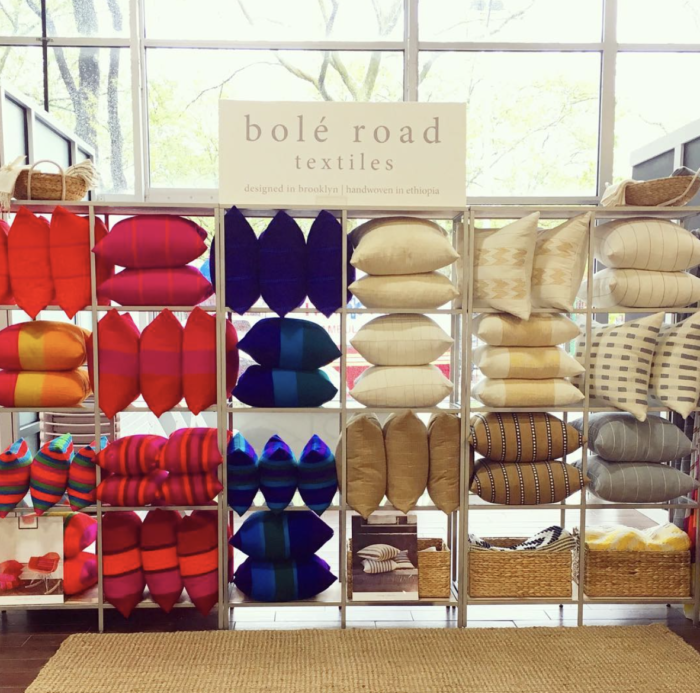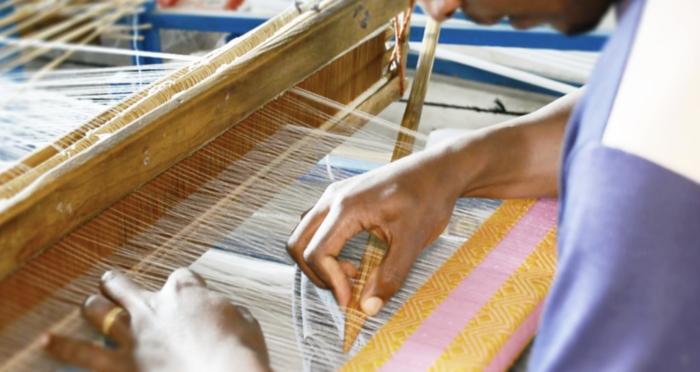After more than a decade at a major architectural firm, designer Hana Getachew knew that she wanted to break out on her own. The turning point came in planning her wedding in 2014. “I wanted to have an element of Ethiopian design for my table linens” to reflect the vibrant patterns and colors of her native land. Her family had left Ethiopia when she was a child, but she still felt intensely connected to the culture. Her journey back home to source her table linens became the spark for a new business.
In Addis Ababa, Ethiopia’s sprawling capital, Getachew went looking for weavers. “I went to one location where one of my family friends sent me. I showed them my designs. It was kind of hilarious because I didn’t know about weaving, and they said it couldn’t be done. It took me a while to understand,” she said, that their traditional looms had their limitations. But the weavers offered their own version of her design that was even more pleasing, in such colors as pink, red, and fuchsia. The linens were a success. “The napkins were beige, with fuchsia and red diamond-shape patterning all around.”

The firm offers an array of products: pillows, throws, towels and more. (Photo courtesy of Bolé Road)
What started with wedding planning is now Getachew’s own housewares firm, Bolé Road Textiles, based in Brooklyn and named after a bustling thoroughfare near her childhood home in Addis Ababa. Getachew designs the patterns in her home studio, then turns them into textiles for pillows, rugs, curtains, towels, and other products in a running conversation with master artisans in Addis Ababa. She sells about half her merchandise through e-commerce on her website and the rest through retailers, including Home of the Brave in Greenpoint and Collyer’s Mansion in Brooklyn Heights.
Two Families of Design
Most of Getachew’s collections are inspired by nature, including landscapes and flora. Two were based on traditional textiles: the Konso Collection, drawing on styles from the south of Ethiopia, and the Heritage Collection, inspired by the customs of the Ethiopian Highlands. “Traditional Ethiopian dresses in most of the country are all-white cotton with colorful patterns on the hem, cuff, and sometimes neckline. These patterns, called tibeb, can be extremely decadent and saturated with color,” says Getachew. By contrast, the clothing of other regions is often bold throughout. “Southern Ethiopia is comprised of over 80 ethnic groups, so it’s difficult to generalize. But in the areas known for weaving in the south, the entire garb will typically be full of pattern and color.”

All of Bolé Road’s products are hand-woven according to a traditional process (Photo courtesy of Bolé Road)
When Getachew was three years old, her family moved from Addis Abbaba to Montreal, where they lived for a few years before moving to New York. Getachew graduated from Cornell University with a degree in interior design and went on to become an associate principal at Studios Architecture in Manhattan, where she designed the offices of major corporations. Along the way, however, she made a return trip to Ethiopia 18 years after she had left, and never forgot the “overwhelming beauty and power of my first homecoming.”
How She Got Started
Leaving her job at a big firm was a “scary thing,” since she loved the work, but she went with her instinct. (See sidebar.) “I spent several months designing and producing two textile collections, which included a trip to Ethiopia to finalize the pieces in conversations with weavers, who are organized into collectives. “Anytime I approach them with a design, they’ll come back with something that’s even better. I couldn’t believe the variety of designs, altering my design a little.” While Getachew always planned to sell her products via e-commerce, she decided to debut her brand with an event: Bklyn Designs in 2015, where her distinctive aesthetic got noticed.
 Tips & Takeaways
Tips & Takeaways
- “Saving enough to fund the early stages was difficult. It takes careful planning.
- “I took a few free business classes from NYC Business Solutions. They were extremely helpful in discussing all aspects of running a business.
- “The most useful advice to me was to not get bogged down with fine-tuning your business plan or ideas, and to ‘just start.’”
- Once Getachew began showing her products at design shows, “Neighbors and peers recognized me as a local brand that they’re excited about.”
Since her first trip to meet the artisans of Addis Ababa, Getachew has learned quite a bit about weaving. “While western looms typically have four or more harnesses and treadles, allowing weavers to easily lift up various combinations of yarns on the warp to create intricate patterns, Ethiopian looms only have two harnesses. This means that in order to create a pattern the yarns need to be lifted manually with a stick in a technique that’s similar to what we call ‘double weave’ in the west,” she explains on her website. “And because of the differences in their looms, Ethiopian weavers often have to do much more manual work than weavers in the west. Bolé Road’s process can be even more challenging as we often introduce new and intricate designs that are outside our artisans’ traditional repertoires.”
Bolé Road produces small batches in each of its runs, so any particular design comes in a limited quantity. The material used most often to make the textiles is hand-processed Ethiopian cotton yarn, known for its thick and soft texture. Getachew says that all of her products are “ethically sourced” and she donates a portion of her profits to the imagine1day Girl Fund, a group dedicated to the education of girls in rural Ethiopia. “These girls are my sisters, my cousins, my friends, and only a few twists of fate separates my life from theirs.”
Getachew plans to expand her textile line, including fabric by the yard. She’ll be displaying Bolé Roads new products at this year’s Bklyn Designs, May 5 to 7 at the Brooklyn Expo Center in Greenpoint. By the way, the wedding that launched a business also led to a growing family. Getachew and her husband, a screenwriter, now have a nine-month-old daughter. After the baby was born, Getachew launched Bolé Road Baby, with pillows, hooded towels, and a swaddle.
(Editor’s Note: Readers of The Bridge can get a $5 discount on general admission tickets to Bklyn Designs by using the code BKD-BRIDGE. The Bridge is a sponsor of the show.)